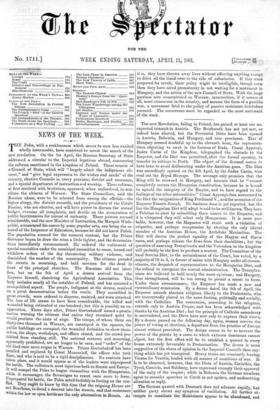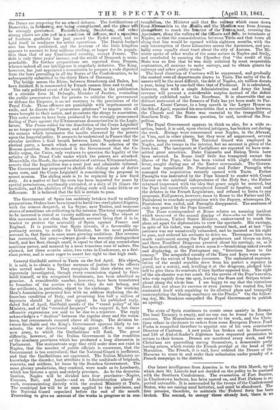a Palatine to elect by submitting three names to the
Emperor, and, it is whispered they will select only Hungarians. It is more pro- - bable, however, that the Magnates will resist such a violation of - etiquette, and perhaps compromise by electing the only liberal , member of the Austrian House, the Archduke Maximilian. The - Diet will decree the perfect equality of the Magyar and Slavic - races, and perhaps release the Jews from their disabilities; but the - question of annexing Transylvania and the Vojvodina to the kingdom will probably be the first to produce a contest. The Committee of the local Serviau Diet, to the astonishment of the Court, has voted, by a ,majorityof 19 to 3, in favour of union with Hungary under all circum- stances, the despatch of representatives to the Hungarian Diet, and the refusal to recognize the central administration. The Transylva- nians are believed to hold nearly the same opinions; and Hungary, thus strengthened, will be too strong to permit a resort to force. Under these circumstances, the Emperor has made a new and extraordinary concession. By a decree dated the 9th of April, the Emperor accords absolute religious liberty to the Protestants, who. are unreservedly placed on the same footing, politically and socially, with the Catholics. The concession, according to the telegram, extends only to Austria Proper, and has been acknowledged with thanks by the Austrian Diet ; but the principle of Catholic ascendancy. is surrendered, and the Diets have now only to express their views. By a decree passed on the following day, again, women receive the power of voting at elections, a departure from the practice of Europe almost without precedent. The design seems to be to increase the power of the priests by a move to which extreme democrats cannot object, but the first effect will be to establish a quarrel in every house extremely favourable to Protestantism. The decree is more suggestive of the chaos of opinion in the Imperial Councils than any- thing which has yet transpired. Heavy trains are constantly leaving Vienna for Venetia, loaded with all manner of munitions of war. It is to be observed, however, that the Diets of Austria, Carinthia, the Tyrol, Carniola, and Salzburg, have expressed strongly their approval of the unity of the empire; while in Bohemia the German members agree to consider speeches in Czech as not spoken, and undeserving attention or reply.
The German quarrel with Denmark does not advance rapidly, but neither party shows any symptom of vacillation. All further at. tempts to conciliate the Holsteiners appear to be abandoned, and
the Danes are preparing for an mined defence. The fortifications of Danevirke, in Sclig, are being strengthened, Sad the place' -will be strongly garrisoned. Fredericksburg, Randsbnag, mid other strong places are alba put in a condition of defence, Aid a squadron of fourteen gunboats has just passed the • Eyder canal; and to hold itself in readiness for active operations. The Danish budget also has been published, and the revenue of the little kingdom appears to amount to four millions sterling, or larger for its popula- tion than that of any Continental country, except France. The debt is only three years' income, and the credit of Denmark is unim- peachable. No further preparations are reported from Prussia, whence indeed all our intelligence is singularly defective. The King, however, has just appointed a commission to prepare a code digested from the laws prevailing in all the States of the Confederation, to be subsequently submitted to the thirty Diets of Germany.
The bridge across the Rhine, between Strasbourg and Baden, has been finished. It is commanded by French cannon from end to end.
The only political event of the week, in France, is the publication of a circular from M. Delangle, Alinister of Justice, reminding the public prosecutors that for priests to criticize the government or defame the Emperor, is an act contrary to the provisions of the Penal Code. Those offences are punishable with imprisonment or exile, and he directs the " procureurs gen6raux" to inquire into all eases brought to their notice, and prosecute the clergy to conviction. This order seems to have been produced by the strongly pronounced feeling of Paris against the Ultmmontane demonstration in the Legis- lature. The Ps-ease called for the dissolution of the Corps Legislatif as no longer representing France, and all the journals have approved the menace which terminates the insults showered by the priests upon the Imperial policy. It seems to be understood in France that the circular involves a final breath between Louis Napoleon and the clerical party, a breach which may accelerate the solution of the Roman question. So determined is the Government that the Ca- tholic organ, the Union, only ventures to question thelegality of the articles of the Penal Code under which the priests are attacked. Meanwhile, theifonde, the representative of extreme Ultramontanism, asserts that the Inquisition was a most just and admirable tribunal. The Government has proposed to abolish the sliding scale of duties upon corn, and the Corps Legislatif is considering the proposal in secret session. The sliding scale is to be replaced by a low fixed duty. As a matter of fact the corn has been imported for years by special permissions, continually extended, at a duty of 25 francs the hectolitre, and the abolition of the sliding scale will make little or no difference. It is believed that the bill is certain to pass.































